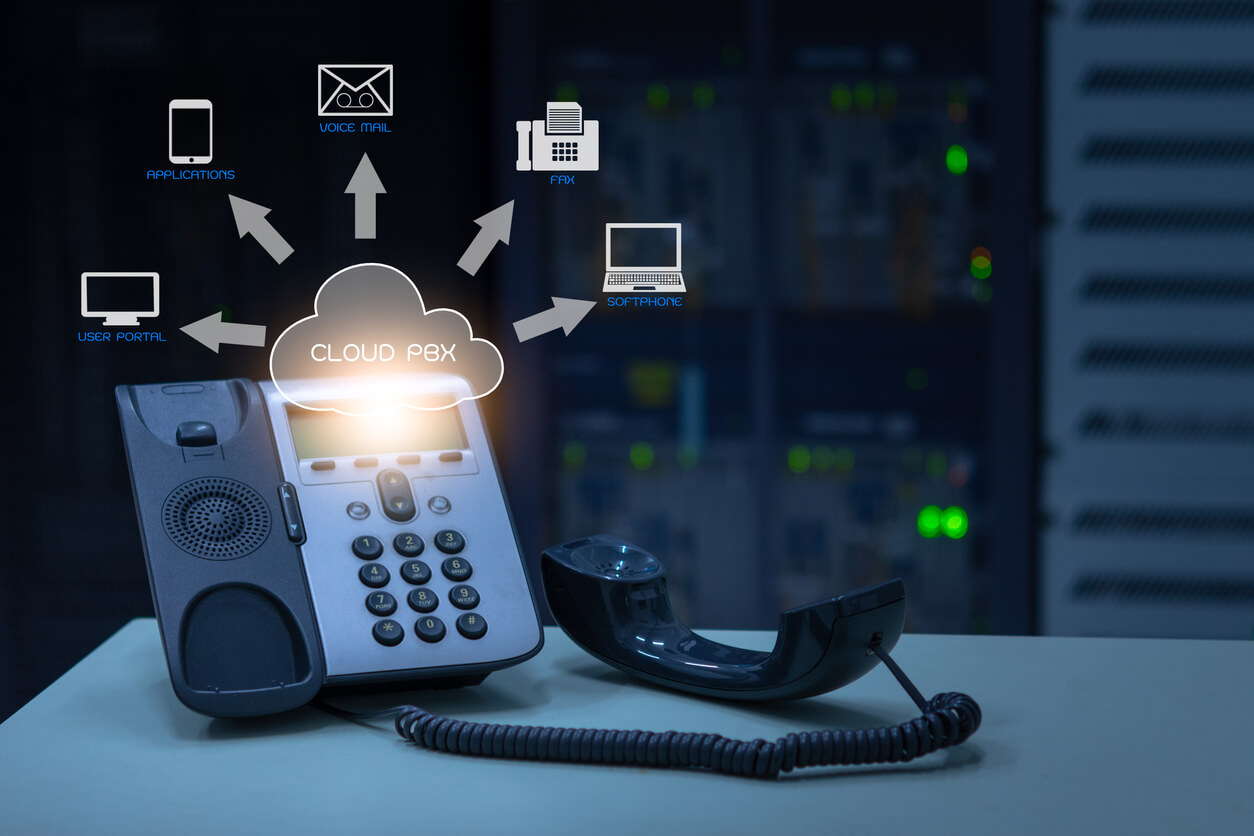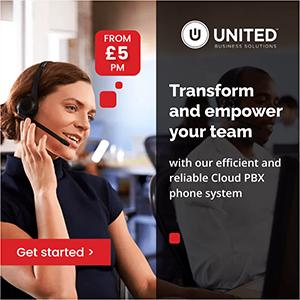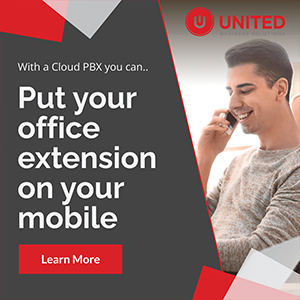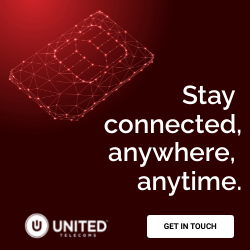Blog
What are the Main Functions of a PBX System?

It’s no secret that many businesses are switching to PBX systems to improve their productivity and lower costs; but, which system is suitable for your company or even for an entrepreneur? Well, it all comes down to the main functions of a PBX system.
In this article, we’ll briefly define what PBX is, explore the different types of PBX systems, and also look at the main features and benefits that they offer businesses.
What is a PBX system?
The acronym “PBX” stands for Private Branch Exchange. In essence, it’s a private telephone network, usually in a business setting, that allows users to communicate with each other.
Relying on different software and hardware components, PBX acts as a company’s internal telephone network, but it can also make calls to the outside world. It’s fast replacing analog phone systems due to being more productivity-orientated, affordable and effortless to maintain.
What is IP-PBX?
IP refers to Internet Protocol. This method transmits data from one server to another. In telephony technology, IP-PBX is simply a telecommunication device that uses an internet connection to enable users to make or receive calls on analog phones.
This is a useful option if you don’t want to replace your fleet of still-working old-fashioned phones.
It works by converting analog voice signals to a digital equivalent before sending your call to a VoIP service provider. The latter handles the activation and eventual termination of all calls.
What is PABX?
PABX is short for Private Automatic Branch Exchange. To understand PABX better, we need to look further back into history.
At one point in time, entire rooms existed where operators sat and manually transferred incoming calls to their intended destination. This would be a very frustrating experience today since it wasn’t uncommon to wait for a long time to have your call transferred and connected.
Then, PABX-enabled phones arrived, and that was the end of operator rooms. PABX provides the same transfer function at the press of a button, which is a lot faster and more convenient.
The system manages this by making use of extension numbers. Each person in the office is assigned such a number, and when you wish to ring one of your colleagues in the building, you type in their extension number, and the call automatically connects.
What is Cloud PBX?
Cloud PBX remains one of the most popular PBX solutions that businesses choose when they make the leap from older phone networks to something better. This system allows you to run enterprise-grade telephony technology in the cloud, eliminating the need for on-premises cables, servers, databases and other hardware.
There’s a lot to discuss when talking about cloud PBX, but essentially, you can perform tasks at the office or remotely, access organisational information, make and receive calls, hold meetings and utilise business-enhancing apps via the internet.
That’s just scratching the surface of what cloud PBX can bring to the table. Another reason why it’s popular concerns repairs and updates; they are all performed remotely by the hosting service and at a fraction of the cost that you would expect to pay for the upkeep of an analog network.
What is hosted PBX?
For some, a degree of confusion exists around the term “hosted PBX.” This is mostly because cloud PBX is also sometimes referred to as hosted PBX. So, is it the same thing? Well, yes and no.
Cloud PBX can be seen as a form of hosted PBX, but not every hosted system is considered a full cloud telephone solution. Here’s why.
Hosted PBX refers to any telephone network or system that is “hosted.” In other words, it’s kept at a location separate from your business premises, and it’s provided, maintained and updated by a hosting company.
In this sense, cloud PBX certainly ticks the box as a hosted network. However, a true cloud solution always involves a multi-tenanted system that allows you to add or remove users as needed, and not all hosted networks allow this.
How does a PBX system work?
Each of the different PBX systems we discussed works in its own unique ways. However, they do share a central purpose, and that’s to connect all the phones in an office to a single network.
PBX also generally manages all incoming and outgoing calls, routes calls and provides better customer service. You can also expect varying availability of different advanced calling features.
Get a PBX System Quote Now
Features of PBX
PBX features can vary from system to system. However, here are some of the best functionalities that these phones are known for:
- Call forwarding, routing and transfer
- Call queuing and hold music
- Call logging
- Automated attendant
- Caller ID and caller ID blocking
- Speed dial and click-to-call
- Sound recording and reproduction
- Call recording software
- Call detail record
- Conference calling
- Voicemail
- Extension
- Call screening and management
- Computer telephony integration
- Automatic call distributor
- Call analytics
- Last-call return
PBX system benefits for businesses
There’s no doubt that PBX phone systems provide businesses with great benefits; but, what are the main reasons that prompt companies, big and small, to move their phone service to PBX?
- Seamless Connection Between Different Locations
PBX connects all employees in the same building – but that’s just the start. It can also link multiple office locations, and this conveniently eliminates the need for separate phone systems.
Some PBX systems, like cloud PBX, even allow people to work remotely and still stay connected to the rest of your staff, wherever they may be.
- Reliability
PBX is known for reliability in different areas. Audio quality remains clear and consistent; you can transfer calls between different locations with ease, and dropped calls are now a thing of the past.
It’s also rare for PBX to malfunction or shut down entirely. Should a hiccup occur, your hosting provider can usually fix the issue remotely and in a short amount of time.
- Flexibility
PBX’s popularity also hinges on the multi-faceted flexibility of these systems. You can effortlessly add or remove lines as your business grows or downscales. You can also choose between different packages with various features or get a bespoke feature collection that best suits your business.
- Cost Effective
PBX is known for being far more affordable than traditional phone systems, especially the older telephones that charge per call. Companies that rely heavily on phone calls to do business can no longer carry such a financial burden, especially when there are cheaper options available.
For example, cloud PBX is pay-per-line and not for every call you make. PBX in-house calls are usually also free.
- Improved Customer Service
Without clients, where would a company be? Happy customers tend to return and also spread the word about your services and products. Unfortunately, many people negatively judge companies when they call, and either fail to reach the right consultant or the phone just keeps ringing.
PBX offers a multitude of features designed to provide callers with a better customer service experience, including toll-free numbers, automatic connection to the right person within the organisation, auto attendants and on-hold music.
Types of PBX phone systems
There are four main groups of PBX phone systems. The oldest design is often referred to as analog or traditional PBX, and it relies on copper wire (just like normal landlines) to function. This is useful for businesses where internet connectivity isn’t reliable.
On-site VoIP systems arrived next and require a company’s internal internet to provide reliable service. The third group is cloud-based solutions that are hosted off-site. The final group is hybrid PBX, which combines existing PBX infrastructure (even legacy phones) with VoIP components. The latter is a good choice if you want the best features of both traditional and internet-based PBX.
How to choose the right type of PBX system for your business
A good rule is to select a system that supports your company’s needs and goals. To help you narrow down your choices, here are a few important things you need to consider before making a final decision.
The Size of Your Business
Cloud PBX is ideal for businesses that are small to medium-sized, especially if you’re planning to grow in the future. On-site solutions are often better for large companies.
The Type of Business
Cloud PBX remains the most versatile option. It’s suitable for all types of businesses, including complex fields like healthcare and real estate. However, if you require a handset in every room, for example, in a guest house or hotel, then on-premise systems might be more suitable.
Staff Location and Your Budget
If your staff works at the office, remotely or both – and your budget is lower – then cloud PBX is a good choice. Cloud PBX is also more affordable to maintain and repair than traditional on-site PBX systems.
The latter is commonly more expensive when it comes to upfront costs (and repairs), but they are more reliable in areas where internet connectivity is a little dodgy, and your employees work exclusively at a business premises.
Which Features Do You Need?
All PBX systems offer the same basic call features, including auto attendant and call transfer. However, analog systems will always be more limited. If you’re looking for more variety and advanced features like video conferencing, CRM integration, call analytics, mobile extensions and more, then Cloud PBX is the best choice.
You can reach out to our industry experts, who have extensive experience in PBX solutions. Contact us to find out more about our assessment services and how United Telecoms can transition your telephone network to the PBX system of your choice.
Get Ready with a Quote for Cloud PBX






Got questions? Contact our experts today.
We service the following locations across London and the United Kingdom
Greater London: City of London, Hounslow, Barking and Dagenham, Islington, Barnet, Kensington and Chelsea, Bexley, Kingston upon Thames, Brent, Lambeth, Bromley, Lewisham, Camden, Merton Croydon, Newham, Ealing, Redbridge, Enfield, Richmond upon Thames, Greenwich, Southwark, Hackney, Sutton, Hammersmith and Fulham, Tower Hamlets, Haringey, Waltham Forest, Harrow, Wandsworth, Havering, Westminster and Hillingdon.
What Our Customers Say
“Once we approved the installations we were kept up to date daily with the levels of progress on our various sites and were very impressed with the final installation”
Spear Properties
Get In Touch
London Office
2 Osborne Way
Epsom
Surrey
KT19 8GR
United Kingdom (UK)
Tel: 033 1630 0516
Tel: 020 3399 8011
Email: info@united-telecoms.co.uk
We're the experts so that you don't need to be!
PBX Phone System
Beginner's Guide
Voice & Hosted PBX
Resources
PABX Relocation and
Reinstallation
PBX Phone System
Resources